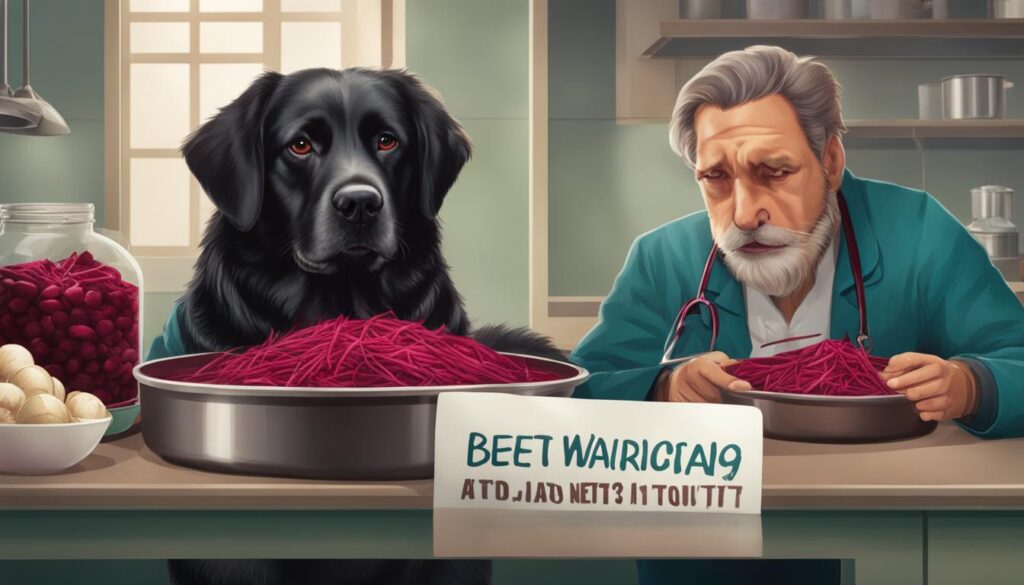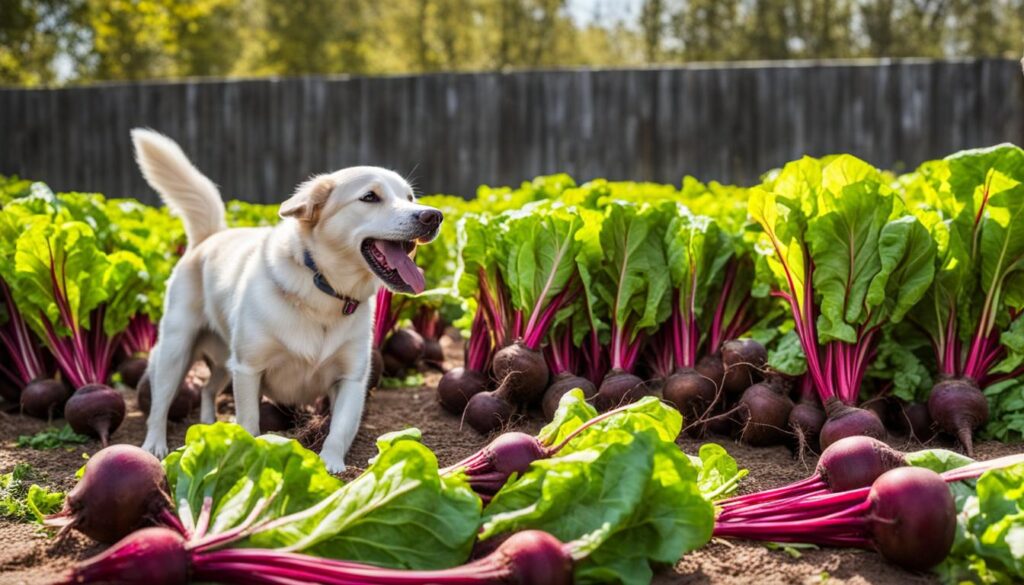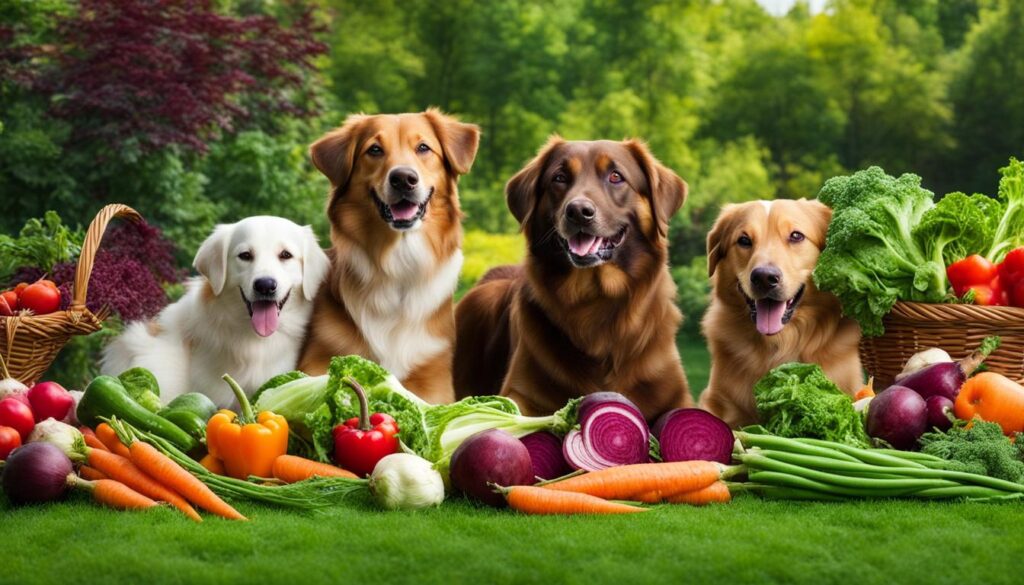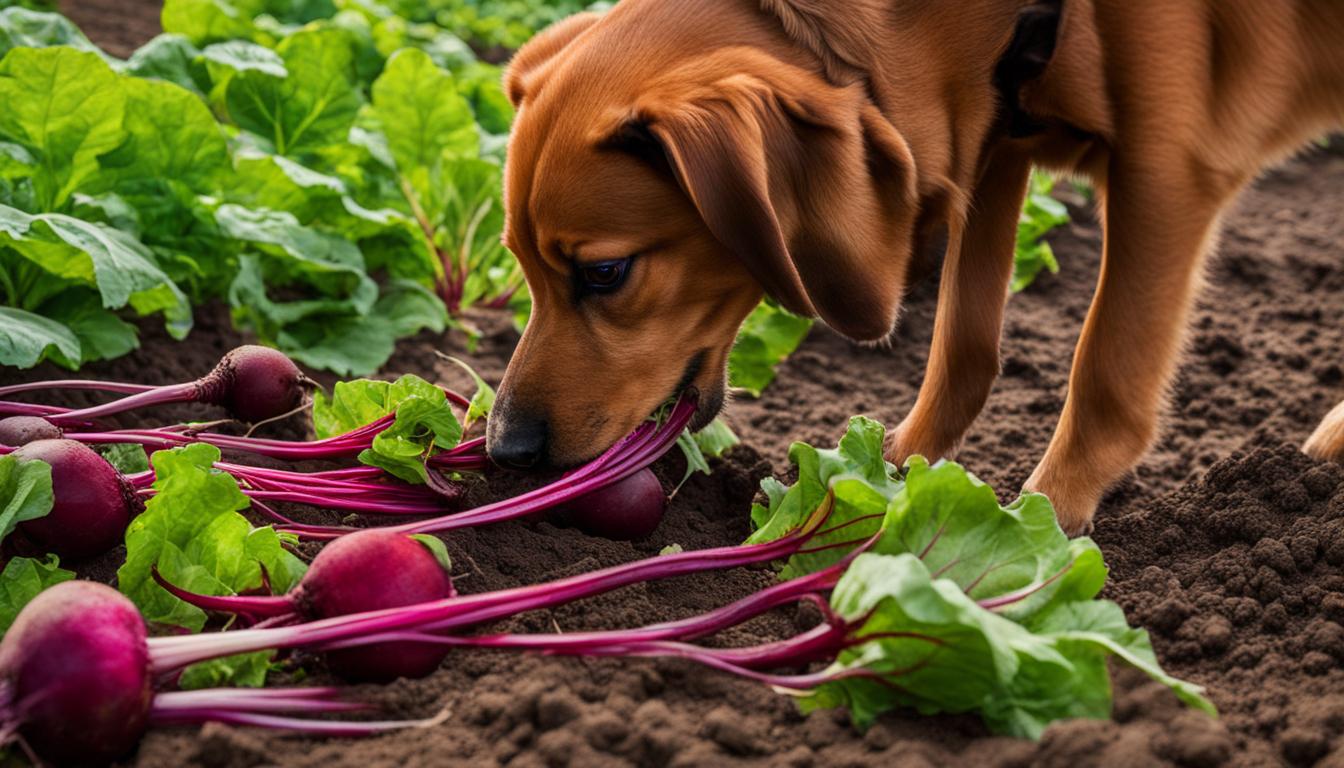Are you wondering if it’s safe to share your love for beets with your furry friend? Well, the good news is that dogs can indeed eat beets! These colorful root vegetables pack quite a nutritional punch, providing a range of vitamins and minerals that can benefit your dog’s overall health. However, there are a few things you need to know before adding beets to your dog’s diet. So, let’s dig into the details and explore the benefits and considerations when it comes to feeding beets to your canine companion.
Key Takeaways
- Beets are safe for dogs, but they should be fed in moderation as a snack or food topping.
- Beets are packed with fiber, vitamins, and minerals that can benefit your dog’s skin, coat, and digestion.
- Too much sugar and oxalic acid in beets can be harmful to dogs, so always check with your vet before introducing beets into your dog’s diet.
- Beets can be fed raw or cooked, but make sure they are plain and unseasoned.
- Avoid pickled beets and beet juice, as they may contain additional ingredients that are not safe for dogs.
Nutritional Benefits of Beets for Dogs
Beets offer a range of nutritional benefits for dogs, making them a healthy addition to their diet. These vibrant root vegetables are packed with essential vitamins and minerals that can support your dog’s overall health and well-being.
One of the key nutritional benefits of beets for dogs is their high vitamin C content. This powerful antioxidant can help boost your dog’s immune system, protecting them from common illnesses and infections. Beets also contain fiber, which aids in digestion and helps regulate bowel movements.
Additionally, beets are rich in potassium, folate, and magnesium. Potassium is vital for maintaining healthy muscles and nerves, while folate supports red blood cell production. Magnesium is important for bone health and can help prevent the development of conditions such as osteoporosis.
“Beets offer a range of nutritional benefits for dogs, making them a healthy addition to their diet.”
When feeding beets to your dog, it’s important to remember that moderation is key. While beets are nutritious, they should not replace a balanced diet. Incorporate beets as a snack or food topping rather than a primary source of nutrition. Too much sugar and oxalic acid, found in high amounts in beets, can be harmful to dogs.
| Nutrient | Nutritional Benefits |
|---|---|
| Vitamin C | Boosts immune system |
| Fiber | Aids digestion |
| Potassium | Maintains healthy muscles and nerves |
| Folate | Supports red blood cell production |
| Magnesium | Promotes bone health |
In summary, feeding beets to your dog in moderation can provide them with valuable nutritional benefits. The high vitamin C content, fiber, and essential minerals can support their immune system, digestion, and overall health. However, always consult with your veterinarian before introducing any new food into your dog’s diet to ensure it is suitable for their specific needs.
Health Risks and Considerations When Feeding Beets to Dogs
While beets are generally safe for dogs to eat, there are some health risks and precautions to keep in mind. One of the main concerns is the high oxalic acid content in beets. Oxalic acid can contribute to the formation of bladder stones, urinary crystals, and kidney stones in dogs. Therefore, it is important to be mindful of the oxalic acid levels in your dog’s diet, especially if they have a history of these conditions or calcium deficiencies.
Another consideration when feeding beets to dogs is their high carbohydrate and sugar content. A diet high in carbs and sugars can lead to pancreatitis and obesity in dogs. It’s important to remember that beets should only be given in moderation and as a snack or food topping, not as a primary source of nutrition.
Some dogs may also experience digestive issues when eating beets. The acidity of beets can cause gas and diarrhea in sensitive dogs. To avoid these problems, introduce beets gradually into your dog’s diet and monitor their response. If you notice any adverse reactions, it’s best to consult with your veterinarian.

Possible Health Risks of Feeding Beets to Dogs:
- Increase the risk of bladder stones, urinary crystals, and kidney stones
- Contribute to pancreatitis and obesity
- Causes digestive issues like gas and diarrhea
By being aware of these health risks and taking proper precautions, you can safely incorporate beets into your dog’s diet and harness their nutritional benefits. However, it’s always recommended to consult with your veterinarian before making any significant changes to your dog’s diet.
Feeding Options for Dogs: Raw and Cooked Beets
When it comes to feeding beets to your furry friend, you have options. Beets can be served either raw or cooked, depending on your dog’s preferences and digestion. Both options have their own benefits and considerations.
Feeding raw beets to dogs allows them to enjoy the maximum nutritional benefits of this vibrant vegetable. Raw beets retain more vitamins and minerals compared to cooked ones. However, it’s important to note that dogs might find raw beets hard to digest. To make it easier for them, grate or cut the beets into small, bite-sized pieces before serving.
If feeding raw beets doesn’t sit well with your dog or their digestion, cooked beets can be a great alternative. You can bake, roast, or boil beets until they are tender. The cooking process softens the beets, making them easier for dogs to chew and digest. Remember to keep the beets plain and unseasoned, as added spices and flavors can upset your dog’s stomach.
Ultimately, the best way to feed beets to your furry friend depends on their individual preferences and digestion. Some dogs may enjoy the crunchiness of raw beets, while others prefer the softer texture of cooked ones. Regardless of the method you choose, always wash and peel the beets before serving to ensure that they are clean and safe for your dog to eat.
| Feeding Options | Pros | Cons |
|---|---|---|
| Raw Beets | Retain more nutrients | Can be difficult to digest |
| Cooked Beets | Easier to chew and digest | Loss of some nutrients during cooking |
Can Dogs Eat Other Forms of Beets?
While fresh beets are generally safe for dogs to eat in moderation, other forms of beets may not be as suitable for canine consumption. Let’s explore whether dogs can eat pickled beets, canned beets, and drink beet juice.
Can Dogs Eat Pickled Beets?
Pickled beets should be avoided when it comes to feeding dogs. Pickling often involves the addition of ingredients like sugars, vinegar, and onions, which can be harmful to dogs. These additional ingredients can cause digestive issues, upset stomachs, and even lead to more serious health problems. Stick to fresh beets instead for a safe and healthy treat for your furry friend.
Can Dogs Eat Canned Beets?
Canned beets can be fed to dogs as long as they do not contain any added salt or other flavors. It’s important to check the label and ingredients before feeding canned beets to your dog. Some canned beets may have added preservatives or seasonings that can be harmful to your canine companion. If the canned beets are plain and contain only beets and water, they can be given to your dog in moderation.
Can Dogs Drink Beet Juice?
While beet juice may seem like a healthy option, it is not recommended for dogs. Beet juice is high in sugar content, which can lead to weight gain, diabetes, and other health problems in dogs. Additionally, beet juice lacks the beneficial fiber found in whole beets. It’s best to stick to feeding your dog fresh beets or other dog-friendly vegetables for optimal nutrition.
| Can Dogs Eat Pickled Beets? | Can Dogs Eat Canned Beets? | Can Dogs Drink Beet Juice? |
|---|---|---|
| Avoid pickled beets as they contain harmful ingredients like sugars and onions. | Canned beets can be fed as long as they do not have added salt or other flavors. | Beet juice is not recommended for dogs due to its high sugar content. |
How Much Beets Can Dogs Eat?
When it comes to feeding beets to your furry friend, moderation is key. It’s important to introduce beets slowly and in small quantities to prevent any digestive issues. The recommended amount of beets to feed depends on the size of your dog. As a general guideline, you can start with 1-2 teaspoons of beet puree per 15 pounds of body weight.
Feeding your dog the right portion of beets ensures they can enjoy the nutritional benefits without overloading on carbs and sugars. However, it’s crucial to remember that beets should not replace a balanced diet. They should be given as a snack or food topping, rather than a main meal.
The recommended amount of beets for dogs:
| Dog Weight | Beet Puree Amount |
|---|---|
| Under 15 pounds | 1-2 teaspoons |
| 15-30 pounds | 2-4 teaspoons |
| 30-50 pounds | 1-2 tablespoons |
| Above 50 pounds | 2-4 tablespoons |
Remember that these are general recommendations and may vary depending on your dog’s individual needs. It’s always a good idea to consult with your veterinarian for personalized feeding advice.

By following the recommended portions, you can ensure that your dog receives the benefits of beets without any adverse effects. As with any new addition to your dog’s diet, it’s important to monitor their response and watch for any signs of allergies or digestive upset. With the right amount of beets and proper guidance from your vet, your furry friend can enjoy this nutritious treat in a safe and healthy way.
Other Vegetables Safe for Dogs
Aside from beets, there are several other vegetables that are safe and beneficial for dogs to consume. Incorporating a variety of vegetables into your pup’s diet can provide additional nutrients while adding flavor and texture to their meals. Here are some safe vegetables for dogs:
- Carrots: These crunchy treats are rich in beta-carotene, which supports eye health and boosts the immune system.
- Sweet Potatoes: Packed with vitamins A, C, and B6, sweet potatoes offer a tasty and nutritious addition to your dog’s diet. They are also a good source of dietary fiber.
- Green Beans: Low in calories and high in fiber, green beans are a great option for dogs looking to shed a few pounds. They can also help regulate digestive health.
- Broccoli: This nutrient-dense vegetable is loaded with vitamins C and K, as well as fiber and antioxidants. However, it should be served in moderation due to its potential to cause gas.
Remember to introduce new vegetables gradually and monitor your dog’s reaction for any signs of allergies or digestive issues. It’s always a good idea to consult with your veterinarian before making any significant changes to your pet’s diet.
Feeding your furry friend a balanced diet that includes a variety of safe vegetables can help promote overall health and well-being. Just like with beets, it’s important to limit the quantity of vegetables and ensure they don’t replace essential nutrients from their regular dog food. Adding vegetables as occasional treats or meal toppers can provide a nutritious boost to their diet.

Vegetable Quantity and Preparation
When feeding vegetables to your dog, it’s crucial to consider appropriate portion sizes and preparation methods. Dogs have different nutritional requirements than humans, so it’s essential to feed them vegetables in moderation.
A general guideline is to offer vegetables as a supplement to their regular meals. You can include a small portion of vegetables, around 10% of their daily food intake, to ensure they receive a well-rounded diet. Remember to adjust the quantity based on your dog’s size, age, and activity level.
It’s best to serve vegetables cooked rather than raw, as this makes them easier to digest. Steaming or boiling vegetables until they are soft but not mushy is ideal. Avoid using any seasonings, spices, or additives, as these can be harmful to dogs. Always consult with your vet to determine the best vegetable options and preparation methods for your specific dog.
Conclusion
So, can dogs eat beets? The answer is yes, but in moderation. Beets offer various nutritional benefits for dogs, including essential vitamins and minerals that can support their overall health. However, it’s crucial to remember that beets should not replace a balanced diet. They should be given as a snack or food topping, rather than a main meal.
Before adding beets to your dog’s diet, it’s essential to consider any health risks. Beets contain oxalic acid, which can lead to bladder stones, urinary crystals, and kidney stones in some dogs. If your dog has any kidney stone conditions or calcium deficiencies, it’s best to avoid feeding them beets. Additionally, beets are high in carbs and sugar, which can contribute to pancreatitis and obesity. It’s important to introduce beets slowly and in moderation to avoid any digestive issues.
Remember to consult with your vet before incorporating beets into your dog’s diet. They can provide personalized feeding recommendations based on your dog’s specific needs. And as always, pay attention to your dog’s reactions when introducing any new food. If you notice any adverse effects, discontinue feeding beets and consult your vet.
FAQ
Can dogs eat beets?
Yes, dogs can eat beets in moderation. They provide nutritional benefits but should not replace a balanced diet.
What are the nutritional benefits of beets for dogs?
Beets are packed with fiber, vitamins, and minerals that can support a dog’s immune system, digestion, skin, and coat.
Are there any health risks when feeding beets to dogs?
Yes, beets are high in oxalic acid and can contribute to bladder stones, urinary crystals, and kidney stones. They are also high in carbs and sugars, which can lead to pancreatitis and obesity.
How should I feed beets to my dog?
Beets can be fed raw or cooked, but they should be plain and unseasoned. Raw beets should be grated or cut into small pieces, and cooked beets can be baked, roasted, or boiled.
Can dogs eat pickled beets or canned beets?
Dogs should avoid pickled beets due to added ingredients like sugars and onions. Canned beets can be fed as long as they contain no added salt or flavors.
How much beets can dogs eat?
The amount of beets to feed depends on the size of the dog. As a general guideline, 1-2 teaspoons of beet puree per 15 pounds of body weight is recommended.
What are other vegetables safe for dogs to eat?
Carrots, sweet potatoes, green beans, and broccoli are examples of safe vegetables for dogs. Introduce new vegetables slowly and in moderation.
What should I consider before feeding beets to my dog?
It’s important to consult with a vet and introduce beets slowly. Watch for any adverse reactions such as digestive issues or allergies.





